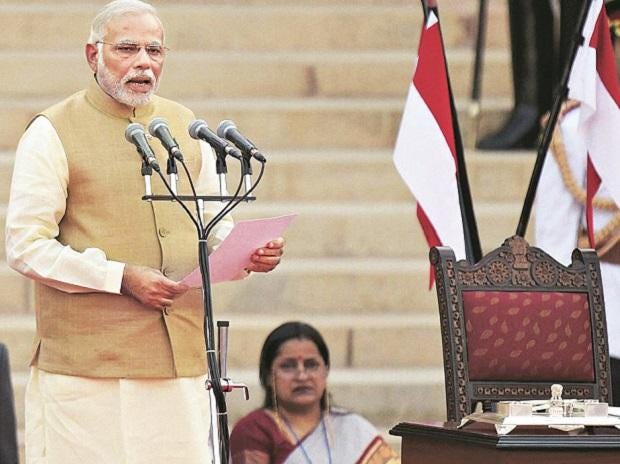
At the time of his first bid to become India’s prime minister five years ago, Narendra Modi was seen by many in Mumbai as a reformer rising to slay crony capitalism, corruption and policy paralysis. It was the bureaucracy in New Delhi that had misgivings about the then chief minister of Gujarat state, known for his highly centralized style of working.
By now, the political capital has accepted Modi as the boss man. By contrast, the financial capital of Mumbai is anxious about further centralization of power. He’s already being referred to as India’s Xi Jinping. Given the difficulties that have beset China’s private sector under the president’s muscular leadership, that comparison isn’t exactly flattering
Mumbai’s trepidation, based on my recent conversations, arises from not knowing whether Modi will double down on his strongman image and chest-thumping nationalism in his second term, or give India’s institutions the freedom to tackle the economy’s central challenge: a lack of risk capital. In 2014, it was only the balance sheets of the banking system and some large business groups that were toast. Now the problem has spread to smaller companies, shadow banks, and property developers. Even consumers are being singed by debt as income growth in rural areas slows. Private investment turned anemic long ago.
Addressing this challenge will require Modi to acknowledge a simple truth: Countering economic worries with propaganda, jingoism and dubious GDP statistics will have diminishing returns. India’s “mini-Lehman moment,” as I’ve called it since September, is still reverberating. The solution is simple. Let entrenched business families fend for themselves. Don’t give them new contracts or sweetheart deals, or let them hold on to bankrupt firms. That should be done not out of moral compunction but because local businessmen or financiers can’t save the economy. Only North American, European, Australian and East Asian money can.
After Modi’s 2014 election victory, he did make an overture to foreign investors. But his finance minister, Arun Jaitley, didn’t keep the promise of making India’s tax regime more predictable and less adversarial. In the name of protecting mom-and-pop retailers and the sovereignty of Indian consumers’ data, the e-commerce policy now appears to favor tycoon Mukesh Ambani over Amazon.comInc.’s Jeff Bezos. Protectionism has gone up. The Donald Trump administration is far from amused.It’s not too late. Unlike in 2014, institutional structures now exist for large-scale asset monetization.
No comments:
Post a Comment